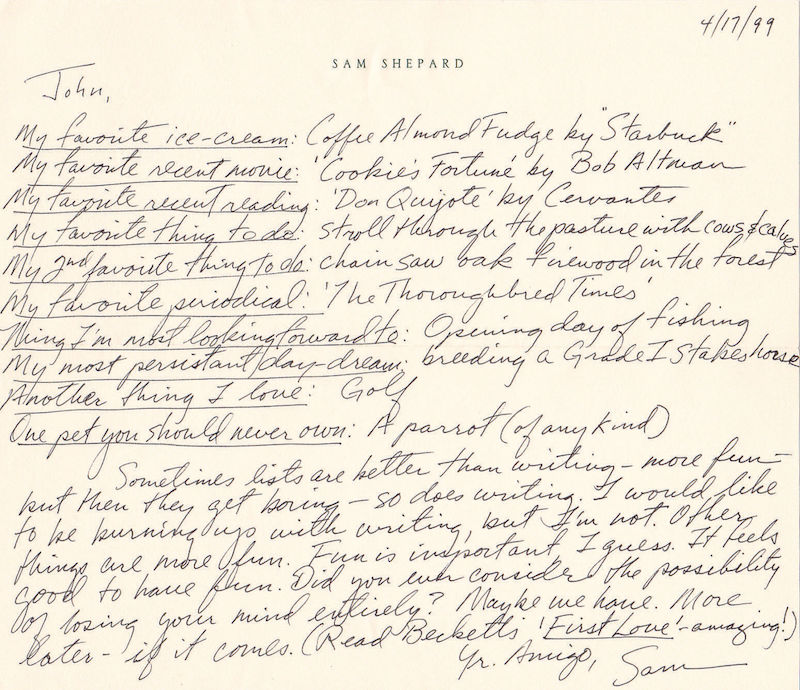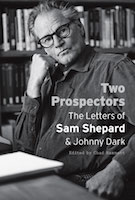March 30, 1985—Santa Fe
John,
Thanks for your letter & notes. Just finished reading the whole batch. Some very inneresting stuff in there. Must be quite a new dimension to be found in that situation of being the “leader.”
It’s very quiet here right now. Shura & Jessie are taking naps. The birds are chirping & a light snow is falling past the windows. I’ve been reading av- idly lately—about six books at once, as usual, so it takes forever to finish one. Finally finished Idiots in Paris though—very simple & touching, particularly the ending stuff. What ideas we’ve all fabricated in our minds about who Gurdjieff was—those of us who never knew him! I got a whole new & different sense of him from that book. Also reading a great piece by Tolstoy called Confession—all about his tremendous moral & spiritual turmoil at the age of about 51. Talk about middle-aged crisis—this guy really put himself through the mill. Then, again, re-reading the 3rd series & going through all the notes from Pentland’s talks that I have.
I’m struggling along with my play, which is very difficult to write because, finally, I’m beginning to see the absolute hopelessness of all forms of negativity—but hopefully, this will be some kind of final definitive piece on my age- old themes of father & son, sister, brother, mother, family, etc. Who knows? If nothing else, I feel as though, after twenty one years of writing I’m finally able to get down to the real essence of what’s behind it. So many masks. Also doing some painting & re-kindled that old interest which has now manifested as yet another obsession for Western Art from the late 1800’s to the turn of the century. Luckily, now—and I don’t know whether this has to do with age or not, but these whirlwinds of obsession are much more short- lived, even though they have all the same characteristic intensity & blind lust behind them.
Me, Jessie & Shura have come into some brand new territory of togetherness now. There’s a real sense of family & belonging to each other. It’s a whole different ball park raising a little girl but it’s quite incredible to see how it demands a different side of me & how positively she responds to it when I allow it in myself.
I’ll write more later. We’re getting set for dinner now. I miss all of you very much. Maybe one day I’ll get over the sense of tragedy about my departure from you all & we can be together without the past hanging so heavy on my head.
Your old friend,
Sam
April 17, 1999

November 23, 1999
John,
Here’s one of my favorite Saroyan collections. I’ve had it for years & can’t even remember where I picked it up. Maybe you’ve read it already—but just in case. After I read that little story of his you sent me I realized suddenly how similar your approach is to his—the flights of fancy right in the midst of the most down-to-earth descriptions; the sense of mortality all the time & the infatuation with turning the everyday into a kind of heroic act. I’ve always loved Saroyan & think he’s totally unique yet still in that American strain of vagabond minstrels like Kerouac & Dos Passos et al. I think you also belong in there somewhere &, although Rosenthal didn’t want to go the distance into publishing I don’t think you should turn away from the possibility. I know you say you don’t care two hoots about getting published but I’ve never met a writer yet who didn’t secretly harbor the desire to see his words in print. Here’s what I think you should do: (I’m going to give you advice now, not because I think I know more about writing than you do but because I think I know more about how to get people to pay attention to it.) Some- body—I think it was Yeats said that; “writing is the social act of a solitary man.” & I believe that’s very true. There’s a need to get something across & I think you’re made of exactly that same stuff that wants to move something through words across to other people. So, no more talk about writing diaries so your grandchildren will have something to pass the time away when you’re long gone. You don’t have any grandchildren anyway so who are you kidding?
Here’s what you have to do: Take a lesson from Saroyan—each one of these little vignettes is framed & structured & clearly laid out. They all have the taste of real experience real people, real place & time. Within that structure he waxes philosophical, he gets cute, he gets funny, he gets tough, he gets emotional & it’s all done, seemingly without effort in the First Person! This, I guess, is where they come up with this hackneyed coinage: “the voice of the writer.” All right, it might be corny & old hat but ultimately I think it’s true. There’s a “voice” to Beckett, a “voice” to Kerouac, a voice to every single one of them who’s worth their salt. There’s a voice to Johnny Dark but you keep running away from it into all these other voices of other people who aren’t nearly as interesting. There’s areas in your stuff (particularly the letters) where the voice is loud & clear. All I’m saying is find that & stick to that & get a real handle on it & turn it into something that other people can get ahold of & say ‘Yes, I know that! I’ve experienced that! This is incredible!’— The same stuff we say when we come across writing that just explodes off the page. I think there’s a lot of material in your book already that could be pulled out & worked on & shaped into something truly great but you can’t leave it buried in there, laying next to long dialogues between 2 stoned guys cracking lame jokes. Nobody wants to wade through the cute stuff in order to eventually dig up something really worthwhile & I don’t think you can wait for someone to come along & do your editing for you. You gotta get in there & pull it out & work at it or else go on & get busy with new stuff. If none of this makes any sense then just rip it up—but it seems to me you’ve got all your ducks in a row now—the move to Deming, your own house & time, precious time to get down to writing. I know this sounds like some kind of ½ time pep talk but you really ought to give yourself a shot at being a writer. Why not? Just tell yourself you’re a writer & get down to it; work at it not with an eye to how disposable it is or how little you care if anybody ever reads it but with an effort toward communicating the real aliveness of your own experience—that’s an extraordinary thing—why not move it across to other people so they can get a taste of it? Enough of this for now. I hope you take this for what it’s meant to be & that’s simply encouragement toward finding what you already have. More later.
Your old amigo—
Sam

July 16, 2010
John,
[. . .] It occurred to me yesterday, strolling around my 150 acres here—it just came to me, you know how it goes—that I believe it’s true that all great writing has come out of solitude & terrible suffering. Look at: Mr. Beckett, Joyce, Kafka, Goethe, Melville, Genet, Rimbaud, Villon, O’Neill, Flannery O’Connor, Emily Dickinson, Juan Rulfo, Pavese, Machado, Cervantes,
Dante, etc. Loners & sufferers all. Not to put myself in the same category at all but, by way of comparison; I know that my best stuff, whether it be plays, stories, screenplays, whatever—has come out of those same two basic ingredients: solitude & suffering. But then I asked myself (myself asking myself)—if I had a choice to continue on that track (not that we do have a choice—it’s the old magic-fairy thing again offering you two alternatives) or, on the other hand, to spend the rest of my life in great happiness with a young woman who delights in my company & I in hers—would I forfeit the art & the agony? the answer is yes!!! Yes, yes, yes!!!!
Which brings me to another association I had yesterday about the great little film you made back in the 70’s with Scarlett, based on a Joyce piece in which that fabulous soliloquy ends with Molly rising into ecstatic orgasm with Yes! Yes! Yes! Where is that film? You must have it tucked away some- where in yr. archives. I think it was made in Super 8. That’s something that should definitely be preserved, don’t you think?
Anyway, here’s to great courage in aloneness & the promise of eternal love—at the same time. Why not?
Yr Amigo
Sam
__________________________________

From Two Prospectors: The Letters of Sam Shepard and Johnny Dark by Sam Shepard and Johnny Dark, edited by Chad Hammett, courtesy of University of Texas Press. Copyright Chad Hammett, 2013.
Sam Shepard
Samuel Shepard Rogers III, known professionally as Sam Shepard, was an American playwright, actor, author, screenwriter, and director. His body of work spanned over half a century. He was the author of 44 plays as well as several books of short stories, essays, and memoirs. Shepard received the Pulitzer Prize for Drama in 1979 for his play Buried Child. Shepard received the PEN/Laura Pels International Foundation for Theater Award as a master American dramatist in 2009.













